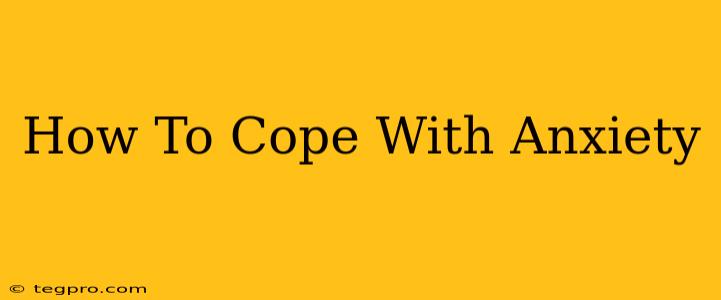Anxiety. That nagging feeling of unease, worry, and dread. It's something millions grapple with, impacting daily life and overall well-being. But coping with anxiety is possible. This comprehensive guide provides practical strategies to help you manage and reduce your anxiety levels, paving the way for a calmer, more fulfilling life.
Understanding Your Anxiety
Before diving into coping mechanisms, it's crucial to understand your anxiety. What triggers it? Is it generalized anxiety, social anxiety, or related to specific situations? Identifying your triggers is the first step towards effective management. Keeping a journal can be invaluable in tracking your anxiety levels and pinpointing potential causes. Consider factors like stress, sleep deprivation, diet, and underlying health conditions. Understanding the why behind your anxiety empowers you to develop targeted solutions.
Recognizing the Symptoms
Anxiety manifests differently in individuals. Common symptoms include:
- Physical: Racing heart, shortness of breath, sweating, trembling, muscle tension, headaches, stomach problems.
- Emotional: Feeling overwhelmed, irritable, restless, on edge, difficulty concentrating, feeling hopeless or helpless.
- Behavioral: Avoiding situations that trigger anxiety, excessive worrying, procrastination, difficulty sleeping.
If you experience persistent or severe symptoms, consulting a mental health professional is vital. They can provide a proper diagnosis and recommend appropriate treatment options.
Practical Strategies for Coping with Anxiety
Now, let's explore practical strategies you can implement to manage your anxiety:
1. Mindfulness and Meditation
Mindfulness techniques, such as meditation, help you focus on the present moment, reducing rumination on past anxieties or future worries. Even a few minutes of daily meditation can make a significant difference. There are numerous guided meditation apps available to help you get started.
2. Deep Breathing Exercises
Deep, controlled breathing can calm your nervous system. When anxiety strikes, practice techniques like diaphragmatic breathing or box breathing to slow your heart rate and reduce feelings of panic. These techniques are easily accessible and can be practiced anywhere, anytime.
3. Regular Exercise
Physical activity is a potent anxiety reliever. Exercise releases endorphins, natural mood boosters that combat stress and anxiety. Find an activity you enjoy, whether it's running, swimming, yoga, or simply taking a brisk walk. Aim for at least 30 minutes of moderate-intensity exercise most days of the week.
4. Healthy Diet and Sleep Hygiene
What you eat and how well you sleep significantly impact your anxiety levels. A balanced diet rich in fruits, vegetables, and whole grains provides the nutrients your body needs to function optimally. Prioritize a consistent sleep schedule, aiming for 7-9 hours of quality sleep each night. Avoid caffeine and alcohol before bed.
5. Cognitive Behavioral Therapy (CBT) Techniques
CBT is a widely effective therapy for anxiety. It helps you identify and challenge negative thought patterns and develop healthier coping mechanisms. Techniques like cognitive restructuring and exposure therapy can be particularly helpful in managing anxiety symptoms.
6. Connecting with Others
Social connection is crucial for mental well-being. Spending time with loved ones, joining support groups, or engaging in social activities can provide emotional support and reduce feelings of isolation. Don't underestimate the power of human connection in combating anxiety.
7. Setting Realistic Expectations
Perfectionism and unrealistic expectations often fuel anxiety. Learn to set realistic goals and accept that it's okay to make mistakes. Practice self-compassion and celebrate your accomplishments, no matter how small.
8. Time Management Techniques
Poor time management can contribute to stress and anxiety. Learn effective time management strategies, such as prioritizing tasks, breaking down large projects into smaller steps, and using planning tools. This will help you feel more in control and less overwhelmed.
When to Seek Professional Help
While these strategies can be immensely helpful, it's crucial to seek professional help if your anxiety is significantly impacting your daily life. A therapist or psychiatrist can provide personalized guidance, develop a treatment plan, and potentially prescribe medication if necessary. Don't hesitate to reach out for support – you don't have to face anxiety alone.
Remember, coping with anxiety is a journey, not a destination. Be patient with yourself, celebrate your progress, and know that you are not alone. With the right tools and support, you can manage your anxiety and live a happier, healthier life.

